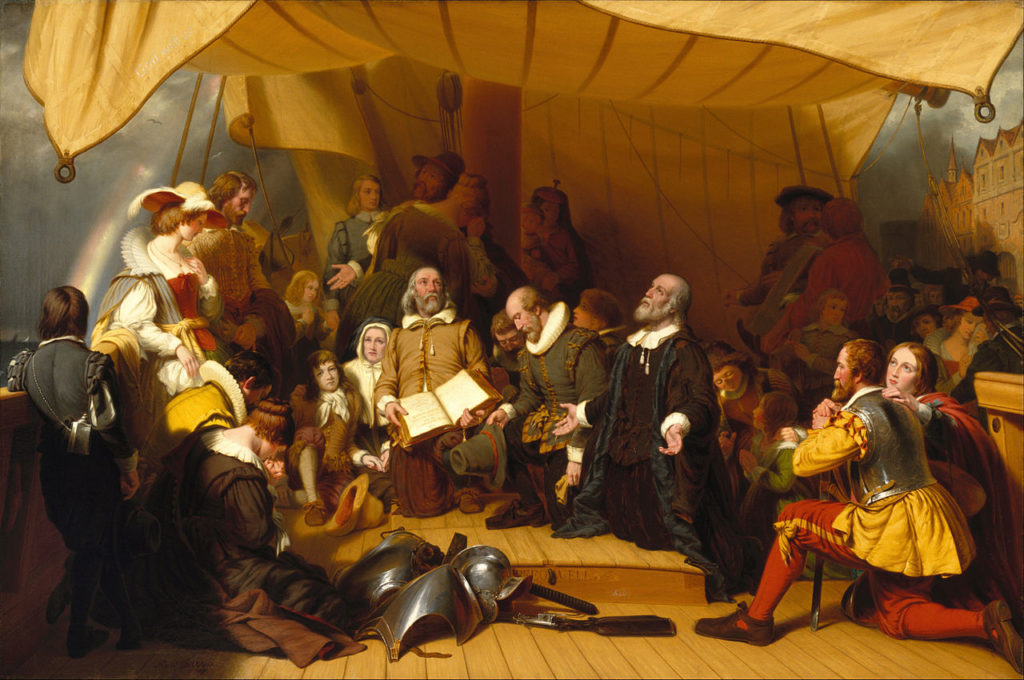Pilgrims Who Founded America Had one Purpose: Preaching the Gospel of Jesus Christ
 We, . . . Having undertaken for the Glory of God, and Advancement of the Christian Faith, and the Honor of our King and Country, a voyage to plant the first colony in the northern parts of Virginia; do . . . solemnly and mutually in the Presence of God and one another, covenant and combine ourselves together into a civil Body Politick…. (Mayflower Compact 1620)
We, . . . Having undertaken for the Glory of God, and Advancement of the Christian Faith, and the Honor of our King and Country, a voyage to plant the first colony in the northern parts of Virginia; do . . . solemnly and mutually in the Presence of God and one another, covenant and combine ourselves together into a civil Body Politick…. (Mayflower Compact 1620)
In most of America’s institutions of learning, the Puritans, Calvinists, and Pilgrims are often portrayed only as separatists. But a close examination of the lives and writings of the early American colonists clearly reveal that “their intent was to seek liberty for themselves and their little ones, and to walk with God in a Christian life, for the rules and motives of such a life were revealed to them from God’s Word.”
They were determined to escape the religious persecution of Europe. Bradford made it clear that the Pilgrims’ purpose was to labor to have the right worship of God and discipline of Christ established in the church, according to the simplicity of the gospel, without the mixture of men’s inventions.
The original group of believers in Nottinghamshire, Lincolnshire, and Yorkshire joined themselves by a covenant to the Lord into a church estate, in the fellowship of the gospel, to walk in all ways made known unto them, according to their best endeavors, whatever it cost them, with the Lord assisting them. They had that great hope and inward zeal of laying a good foundation for the propagating and advancing of the gospel of the kingdom of Christ in those remote parts of the world.
According to Bradford, the Pilgrims came into these parts of America with one aim, namely, to advance the kingdom of our Lord Jesus Christ and to enjoy the liberties of the gospel in purity and peace. The strong grasp of the intellectual and practical side of his and other Pilgrims’ ideas of religious liberty they owed, no doubt, a deep debt to that splendid apostolic figure, their old pastor at Leydon, John Robinson.
The Farewell Sermon
It was evening, and the place was Delfshaven Holland and the date was July 31, 1620. The beloved pastor looked over the pulpit at his flock of around 120 pilgrims for the final time. He then read his last sermon to them before they set sail the following morning on an adventure that would change all their lives:
We are now ere long to part asunder, and the Lord knoweth whether he [Robinson] should live to see our face again. But whether the Lord had appointed it or not, he charged us before God and His blessed angels, to follow him no further than he followed Christ; and if God should reveal anything to us by any other instrument of His, to be ready to receive it, as ever we were to receive any truth by his ministry; for he was very confident the Lord had more truth and light yet to break forth out of His Holy Word.
He took occasion also miserably to bewail that state and condition of the Reformed churches who had come to a period of [standstill] in religion, and would go no further than the instruments of their reformation [i.e. those who had been leaders in the Reformation]. For example, the Lutherans could not be drawn to go beyond what Luther saw; for whatever part of God’s will He had further imparted and revealed to Calvin, they [the Lutherans] would rather die than embrace it.
And so also, saith he, you see the Calvinists, they stick where he [Calvin] left them, a misery much to be lamented; for though they were precious shining lights in their times, yet God had not revealed His whole will to them; and were they now living, saith he, they would be as ready and willing to embrace further light, as they had received.
Here also he put us in mind of our church covenant, at least that part of it whereby we promise and covenant with God and one another to receive whatsoever light or truth shall be made known to us from His written Word; but withal [he] exhorted us to take heed what we received for truth, and well to examine and compare it and weigh it with other Scriptures of truth before we received it. For saith he, it is not possible [that] the Christian world should come so lately [recently] out of such thick antichristian darkness, and that full perfection of knowledge should break forth at once.
As heirs of their risky and adventurous faith, new believers in the U.S. and around the world still seek to embrace this further light.
The Great Sacrifice
William Bradford wrote:
I do not think many Americans will gaze upon it without a little trembling of the lips and a little gathering of mist in the eyes, as they think of the story of suffering, of sorrow, of peril, of exile, of death and of lofty triumph…..There is nothing like it in human annals since the story of Bethlehem. These English men and women going out from their homes in beautiful Lincoln and York, wife separated from husband and mother from child in that hurried embarkation for Holland, pursued to the beach by English horsemen; the thirteen years of exile; the life at Amsterdam in alley foul and lane obscure; the dwelling at Leyden; the embarkation at Delfthaven; the farewell of Robinson; the terrible voyage across the Atlantic; the compact in the habour; the landing on the rock; the dreadful first winter; the death roll of more than half the number; the days of suffering and of famine; the wakeful night, listening for the yell of the wild beast and the war-whoop of the savage; the building of the State on those sure foundations which no wave nor tempest has ever shaken; the breaking of the new light; the dawning of the new day; the beginning of the new life and the enjoyment of peace with liberty…….
The phrase, Pilgrim Fathers commonly used by Americans, has created a vague impression of severe old men with long beards wearing long traditional attires similar to what is associated with ministers of religion. But the majority of the Pilgrims at the time of their arrival in America were still young men and women who sacrificed everything:
They had an inward zeal of laying good foundations, or at least of making some way for the propagation and advance of the kingdom of Christ in the remote parts of the world, even thogh they should be but steeping stones to others in the performance of so great a work.
For instance, William Bradford was thirty-one years old in 1621, when he was first elected to the office of governor. Most of other Pilgrims were about the same age or younger. Unfortunately, many people, born and raised in the United States have forgotten their history. Yet, we advance our knowledge and understanding of the world we live in by studying history.
History is not about mere memorization of important people, dates, or events. History is about studying cause and effect—what causes civilizations to develop and what causes them to collapse.
Over and over again, as the Israelites prepared to cross the Jordan River to enter the Promised Land, Moses charged them to remember with gratitude where they came from. Moses continued to remind God’s people of the past, taught them how to live in the present, and urged them to look ahead to the future. They were warned not to forget, especially when prosperity and wealth came.
But sadly the lesson was not learned and “they did not understand nor appreciate His miracles…they hastily forgot His works; and did not wait for His plans to develop in the desert” (Psalm 106:7, 13). How does this apply to us today? Paul tells us,
Now these things are examples (warnings and admonitions) for us not to desire or crave or covet or lust after evil and carnal things as they did….
Now these things befell them by way of a figure [as an example and warning to us]; they were written to admonish and fit us for right action by good instruction, we in whose days the ages have reached their climax (their consummation and concluding period)” (1 Corinthians 10:6, 11 AMP).
While on the contrary, William Bradford vividly remembered God’s past acts on behalf of the pilgrims when they sailed from Plymouth and decided to settle in America. “Our fathers,” said Governor Bradford to his fellow Puritans who landed at Plymouth, “were Englishmen who came over this great ocean, and were ready to perish in this wilderness; but they cried unto the Lord, and He heard their voice, and looked on their adversities and the sons and daughters of the Pilgrims then remembered.”
History demonstrates that the Pilgrims were willing to put biblical and Christian principles in government to the test. Both spiritually and politically, they rose up foundations of many generations. Four hundred years later, the people of the United States are still building on this great heritage that the Pilgrims laid.
Below is the video from CBN about Celebrating the First Landing:
Source and description of Image: The Embarkation of the Pilgrims (1857) by the American painter Robert Walter Weir at the Brooklyn Museum in New York City. Wikipedia


 A listener named Bruce writes in: “Dear Pastor John, I haven’t read your book, Don’t Waste Your Life. The title is convicting enough. The fact is that I have already wasted it; or at least it feels that way. For decades I tried a variety of different ‘careers.’ None of them worked. I tried starting my own business for over 20 years while my wife worked. I earned a PhD, moved to a country where I didn’t speak the language (for my wife’s job) and had a breakdown. Several years later, my wife and I separated.
A listener named Bruce writes in: “Dear Pastor John, I haven’t read your book, Don’t Waste Your Life. The title is convicting enough. The fact is that I have already wasted it; or at least it feels that way. For decades I tried a variety of different ‘careers.’ None of them worked. I tried starting my own business for over 20 years while my wife worked. I earned a PhD, moved to a country where I didn’t speak the language (for my wife’s job) and had a breakdown. Several years later, my wife and I separated. In one of the
In one of the  Part of my role as a Christian journalist the last four decades is to cover what the Holy Spirit is doing around the world. We’ve had many reports on revivals in different parts of the world. One part of the world where there seems to be little activity is Europe. However, a recent guest from England says there are hopeful signs!
Part of my role as a Christian journalist the last four decades is to cover what the Holy Spirit is doing around the world. We’ve had many reports on revivals in different parts of the world. One part of the world where there seems to be little activity is Europe. However, a recent guest from England says there are hopeful signs! Recently, Bob Lidfors, the LK10 Coordinator (along with his wife Barb) in Germany, spent two weeks in Uganda teaching 200 church leaders the CO2 (church of two) concept. In my interview below with Bob, he shares this amazing story.
Recently, Bob Lidfors, the LK10 Coordinator (along with his wife Barb) in Germany, spent two weeks in Uganda teaching 200 church leaders the CO2 (church of two) concept. In my interview below with Bob, he shares this amazing story.
 There has never been a successful and long-lasting atheistic civilization — and there never will be — is the opinion of many astute observers. And it’s also apparently the belief of radio giant Michael Savage, as he issued a dire warning on his Wednesday show.
There has never been a successful and long-lasting atheistic civilization — and there never will be — is the opinion of many astute observers. And it’s also apparently the belief of radio giant Michael Savage, as he issued a dire warning on his Wednesday show. We recently talked about the book you just wrote Pastor John, back on Thursday of last week. . . . In light of that, Brandon in Charlotte, NC writes in: “Pastor John, thank you for your Christ-centered precision and for the tremendous volume of your ministry output. I’m curious how you produce so much content.
We recently talked about the book you just wrote Pastor John, back on Thursday of last week. . . . In light of that, Brandon in Charlotte, NC writes in: “Pastor John, thank you for your Christ-centered precision and for the tremendous volume of your ministry output. I’m curious how you produce so much content.